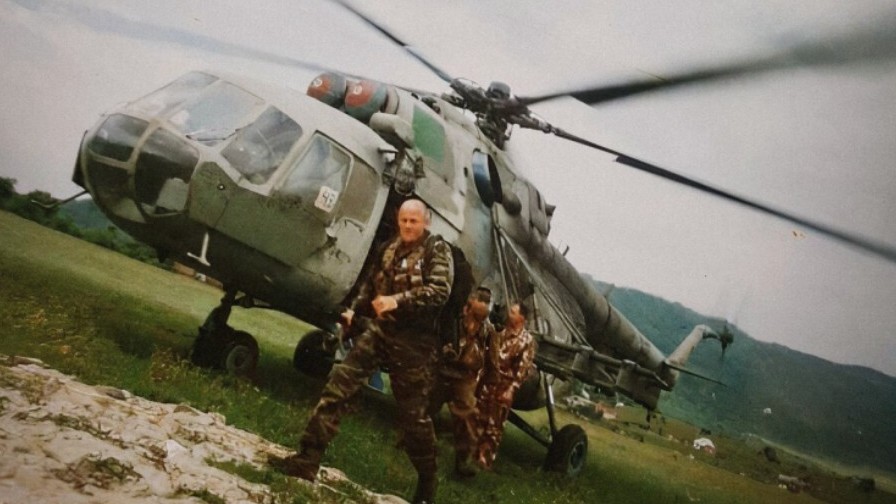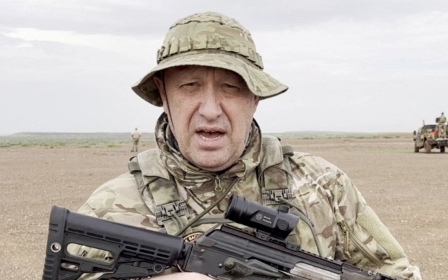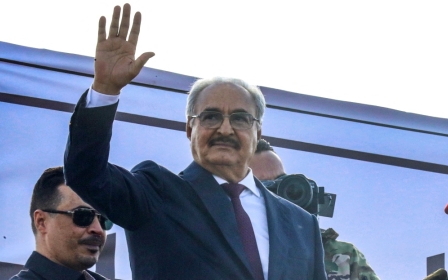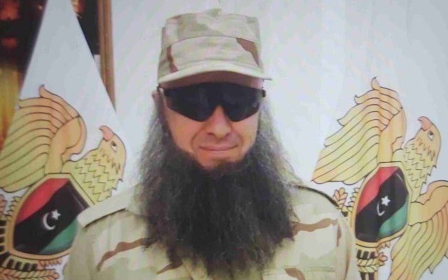Wagner: Dmitry Utkin, Russian nationalism and war in Syria and Libya
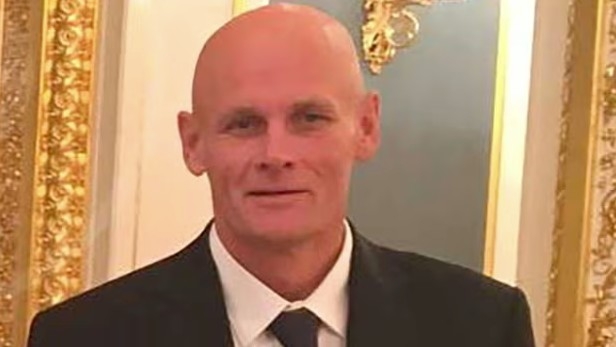
The plane crash that reportedly killed Wagner's chief Yevgeny Prigozhin near Russia’s Tver region on Wednesday also killed the mercenary group's second-in-command, Dmitry Valeryevich Utkin, according to Russian civil aviation officials.
Little is known about the man thought to be the original founder of Wagner and Prigozhin’s right-hand man. While Prigozhin’s face was ubiquitous in global media, Utkin rarely made public appearances. So who was Dmitry Utkin?
Utkin was born in Ukraine in 1970. He eventually left his Ukrainian village for Leningrad, now known as Saint Petersburg, where he enrolled in military school, according to the Dossier Centre, a Russian investigative organisation.
He later went on to become an officer in Russia’s GRU military intelligence service. He served in both Chechen wars in the 1990s, as well as in Syria, where Wagner has been militarily active since 2015 when its mercenaries were deployed to fight alongside President Bashar al-Assad’s forces.
Now, one of Wagner’s main roles is to provide security for oil, gas, and phosphate fields in the central and eastern parts of Syria.
According to an article published by Radio Free Europe Radio Liberty that featured interviews with Wagner commanders, Utkin apparently has a swastika - a symbol synonymous with fascism - tattooed on his shoulder. An image obtained by the Times newspaper appears to confirm this.
Sometimes referred to as the original founder of Wagner, it is thought the group was named after Utkin’s nom du guerre in battle, “Wagner,” the 19th-century German composer who was Utkin’s favourite and who was also famously adored by Hitler.
Utkin never openly declared radical nationalist beliefs, nor was it clear if his own beliefs diffused into Wagner itself, Kirill Semenov, a Libya expert at the Russian International Affairs Council think tank in Moscow, told Middle East Eye.
“Nevertheless, it is known that many radical Russian nationalists signed up for the Wagner group. They have been seen, for example, in Libya,” Semenov said.
Neopaganism
Denys Brylov, the head of the European Center for Strategic Analytics, told MEE that Utkin developed in the special purpose units of the Russian defence ministry's main intelligence directorate, the GRU.
After taking part in the first and second Chechen wars, Utkin rose to the rank of lieutenant colonel, Brylov explained. After retirement, he moved into private security, working for Moran Security Group and later becoming a company commander in the Slavic Corps - the prototype of Wagner.
The unit was a hotbed of Russian ultrnationalism, with some members even spouting neo-pagan beliefs harking back to a pre-Christian Slavic history.
"Many neo-pagans fought in the Slavic Corps, but the group did not last long, having conducted unsuccessful battles in Syria," Brylov added.
In May 2014, Utkin together with a group of Slavic Corps veterans became the commander of his own unit, which was named Wagner in honour of Utkin's own call sign.
"To a large extent, the neo-paganism of Utkin and many of his colleagues in the PMC Wagner was brought by them from the Russian special forces, where this ideology is very popular," said Brylov.
Unlike in Syria, where neo-pagans fight as mercenaries, in Ukraine Russian neo-Nazi neo-pagans fight on both sides of the conflict, Brylov pointed out. Some of them fight on the side of Ukraine (most of them are in the Azov regiment), and some of them fight on the side of Russia (primarily as part of the Wagner).
Libya conflict
Wagner’s fighters have played a significant role in Libya's conflict, helping military commander-turned-warlord Khalifa Haftar gain control of the southern and eastern regions of the country.
With Wagner being deployed to numerous countries including Syria, Libya, Mali, the Central African Republic - and most recently to the war in Ukraine - the group has been able to help Russia expand its influence.
A MEE report revealed that white nationalist graffiti had been found scrawled in Russian on a mosque’s walls in a suburb of the Libyan town of Ain Zara.
“I see mosques on Russian soil, but I’d rather see them in hellfire” read the graffiti, which included the 14/88 neo-Nazi tag where 88 is a white supremacist numerical code for "Heil Hitler".
'I see mosques on Russian soil, but I’d rather see them in hellfire'
- Russian graffiti in Libya
“Their appearance in Wagner is most likely not directly related to the ideology of the group. It's just that Wagner was trying to attract such nationalists as the most active, motivated and trained fighters, and not because Utkin or anyone else set some ideological criteria,” Semenov said.
“The attraction of nationalists to Wagner was thus driven by pragmatic rather than ideological criteria.”
In 2017, the US Department of the Treasury’s Office of Foreign Assets Control announced it would be enforcing sanctions against Utkin, who it described as the founder and leader of Wagner.
The fate of Prigozhin, Utkin and other key Wagner figures was thrown into question after the Wagner Group's failed rebellion against the Russian state on 23 June this year.
Mustering the loyalty of his mercenary group, Prigozhin marched from Ukraine towards Moscow and against the Kremlin and its military leadership.
Twenty-four hours later, Wagner forces turned back and a deal was struck that allowed Prigozhin to safely travel to Belarus in return for ending the mutiny.
Dead but not forgotten
Now, the group’s leader and its senior aides are apparently dead.
On the Wagner-linked Grey Zone Telegram channel, messages glorifying Utkin, “who was and even after the incident will be the permanent commander of the Wagner Group,” confirmed he had died “as a result of the actions of traitors to Russia".
“But even in Hell he will be the best! Glory to Russia!” the message said.
Another message on the Wagner-linked Telegram channel included an excerpt of an interview with Prigozhin that featured Utkin speaking off-camera. “Death is not the end, it’s just the beginning of something else,” Utkin can be heard saying.
“We will all go to Hell, but in Hell we will be the best,” Prigozhin replies.
Middle East Eye propose une couverture et une analyse indépendantes et incomparables du Moyen-Orient, de l’Afrique du Nord et d’autres régions du monde. Pour en savoir plus sur la reprise de ce contenu et les frais qui s’appliquent, veuillez remplir ce formulaire [en anglais]. Pour en savoir plus sur MEE, cliquez ici [en anglais].


